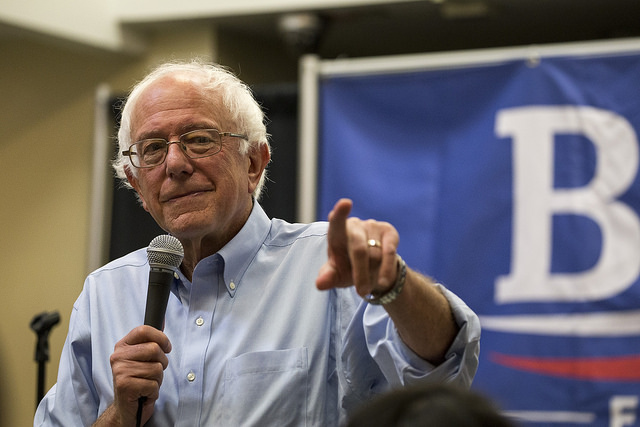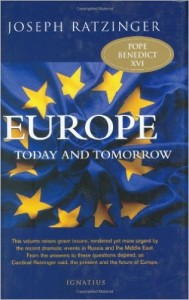
Bernie Sanders for President, CC by 2.0)
On behalf of the Catholic Church, I would like to apologize. I apologize for our complicated theology, especially where the Church and the State intersect. I apologize specifically that the Church has led so many people into thinking that Catholicism is a religion of unbridled capitalism. I apologize that it is a religion that considers socialism antithetical to the very idea of caritas while simultaneously saying that socialism is not antithetical to the very idea of caritas.
An intern at CatholicVote, Kate Fugate, recently wrote an article haranguing Catholics advocating for Vermont Senator and Democratic Presidential candidate, Bernie Sanders. Why? Because Senator Sanders’s socialist agenda “fundamentally undermines the spirit of Christian charity, assuming the marginalized will only be cared for if the federal government forces you to care” and “economic redistribution […] is counter to the belief that God grants our worth and hard work is a mainstay of Catholic teaching.”
On one hand, Fugate is correct in a few of her assumptions. Socialism forces equality by law. The value of work is a mainstay of Catholic teaching. But underlying her argument is a series of poorly defined terms, equivocations, and misinterpretations of Catholic Social Doctrine. The most immediate term that needs to be clearly defined is socialism, with others to follow.

Senator Sanders repeatedly refers to himself as a democratic socialist, as opposed to a socialist. Already, we have reached an impasse: are socialism and democratic socialism the same thing? To answer this question, we must first look at how the Church defines the former and then turn to the latter. Socialism, in the eyes of the Church, has a very specific definition, later amended as real or true socialism (though even here there is ambiguity, especially when one considers Marx’s use of the phrase). Leo XIII, throughout his encyclical Quod Apostolici Muneris, made it clear that the socialism he spoke of was that which strived “to seize and hold in common whatever has been acquired either by title of lawful inheritance, or by labor of brain and hands, or by thrift in one’s mode of life” (Quod 1). In Sollicitudo Rei Socialis, Pope St. John Paul II clearly refers to a planned economy, wherein the State is the owner and decision-making body, placing “everyone in a position of almost absolute dependence, which is similar to the traditional dependence of the worker-proletarian in capitalism” (Sollicitudo 15). Further clarifying, though not in his office as Supreme Pontiff, Joseph Ratzinger wrote that socialism “subdivided into two different paths, the totalitarian and the democratic,” concluding that “democratic socialism was and is close to Catholic social doctrine” (Europe: Today and Tomorrow, page 28).
The Church has in mind totalitarian socialism when it considers socialism as such; that is, a socialism in which the State owns the means of production and a bureaucratic apparatus plans the economy, an admittedly failed and undesirable system.
Approaching a definition of democratic socialism is unquestionably trickier than asking “What does the Church mean by socialism,” primarily because there is no central authority on democratic socialism. We might look at the writings of Michael Harrington, founder of the Democratic Socialists of America (DSA), though even his writings are not completely what Senator Sanders imagines as democratic socialism. To this end, we must let the good Senator speak for himself:
https://www.youtube.com/watch?v=cbUN9UwoBX0Senator Sanders is advocating something radically different than socialism, as used by the Supreme Pontiffs going back to Leo XIII. He is advocating something different than democratic socialism as defined by the DSA’s founder Michael Harrington, whose views were primarily a Distributist model, that workers should own the means of production and that labor precedes capital (which is the Catholic understanding of a humane economy). No, Senator Sanders is advocating something more akin to the Nordic model, a social democracy – a market economy with a strong welfare component. His use of the term democratic socialism is as sloppy as Fugate’s use of socialism, though it is more levelheaded and decidedly more defined. Fugate fails to realize that Senator Sanders is not advocating the totalitarian version of socialism.












